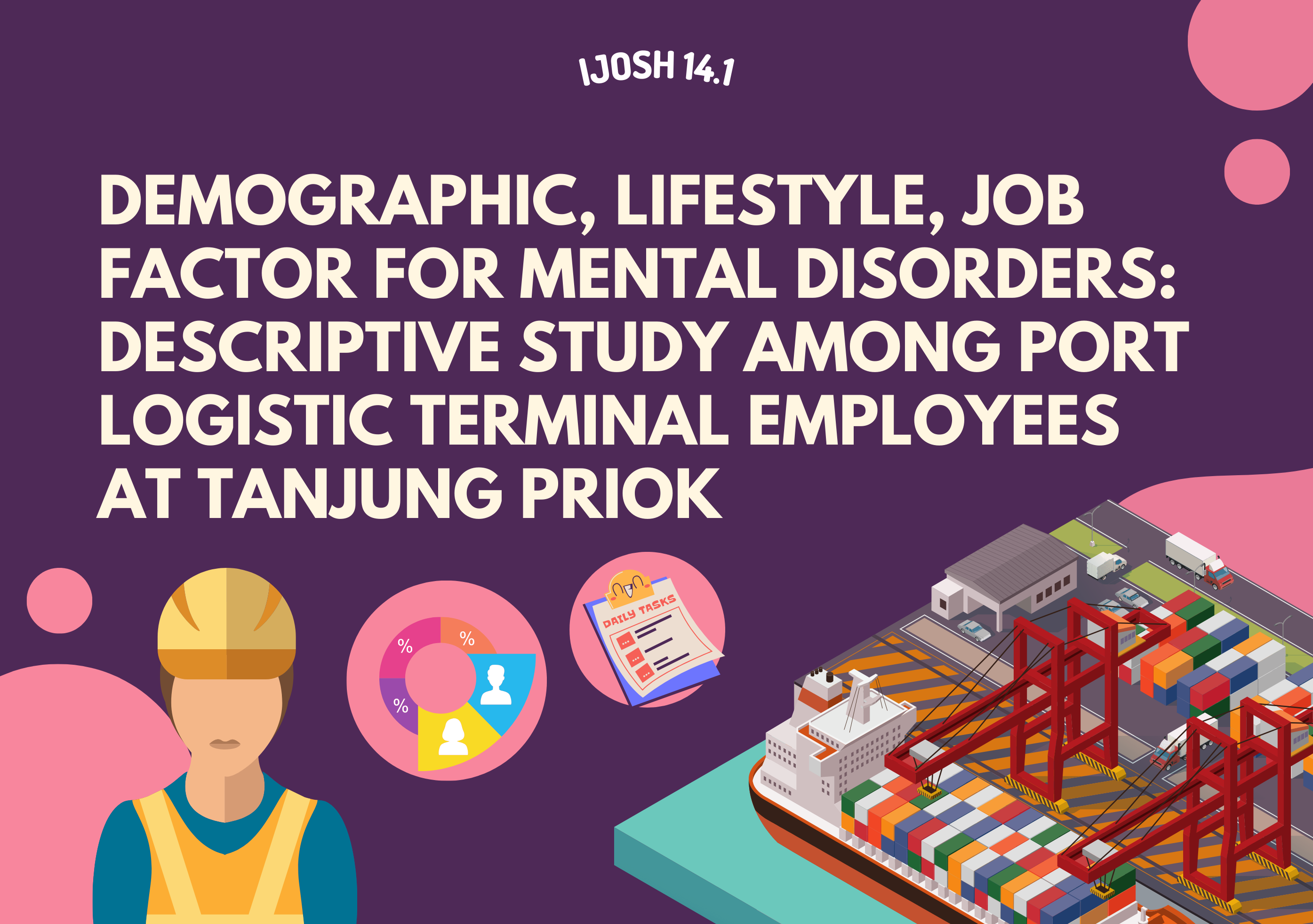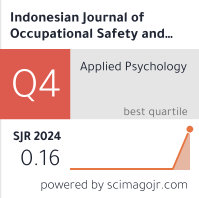Demographic, Lifestyle, Job Factor for Mental Disorders: Descriptive Study among Port Logistic Terminal Employees at Tanjung Priok

Downloads
Introduction: The results of work stress research in the port industry show work stress at the port has the strongest relationship with the mental workload, followed by role ambiguity and interpersonal conflict. However, in the port industry with hot, noisy working conditions, unclear age limits for workers, workers with various backgrounds triggering conflict, long working hours triggering not only stress, but anxiety and depression in workers, results in high absenteeism and hypertension cases in port workers. The aim of this research is see how demographic factors, lifestyle, and job factors contribute to the incidence of mental disorders problems in the port logistic industry. Methods: We carried out descriptive analysis for demographic aspects, lifestyle, and work factors with each component of mental disorders, namely stress, anxiety and depression. Design study for this research is cross-sectional. DASS 42 was an instrument for dependent variable. Data analysis was conducted with the Chi-square test to see the strength of the relationship between the two variables. The sample in this study was 201 with total sampling method. Result: Research results show that demographic factors do not have a strong relationship with mental disorders; lifestyle factors are the factors that have the strongest relationship with mental disorders, namely routine exercise and sleep duration. Work factors do not have a strong relationship with mental disorders at Port Logistic Terminal at Tanjung Priok. Conclusion: Regular exercise and sleeping more than 7 hours can reduce the frequency of mental disorders. Companies can focus on providing their employees with sports facilities and education regarding regular exercise and sleeping more than 7 hours.
Akrimah, W. D., Wardana, I. W., and Tualeka, A. R. (2023) Mental Workload and Work Factors as Predictors of Stress Levels in Port Sector Employees, Indonesian Journal of Occupational Safety and Health, 12(1), pp. 124–135. https://doi.org/10.20473/ijosh.v12i1.2023.124-135.
American Psychological Association. (2021) The American workforce faces compounding pressure APA’s 2021 Work and Well-being Survey results. https://www.apa.org/pubs/reports/work-well-being/compounding-pressure-2021.
Apriliani, K. M., and Soetjipto, D. (2020) Sleep Disorders in Late-Life Depression, Jurnal Psikiatri Surabaya, 9(1), pp. 1-6. https://doi.org/10.20473/jps.v9i1.16026.
Assyifa, F., et al. (2023) Hubungan Jenis Kelamin Dengan Tingkat Kecemasan Pada Mahasiswa PSKPS FK ULM Tingkat Akhir Dalam Pengerjaan Tugas Akhir, Homeostasis:Jurnal Mahasiswa Pendidikan Dokter, 6(2), pp. 333-339. https://doi.org/10.20527/ht.v6i2.9980.
Astuti, R. D., Surmantika, R., and Rubai, M. (2021) Narrative Review: Pengaruh Olahraga Terhadap Penurunan Tingkat Stres, Proceeding National Conference PKM Center Sebelas Maret University,1(1). pp. 245–248. https://103.23.224.239/pkmcenter/article/view/51364.
Bakar, R. M. and Usmar, A. P. M. (2022) Growth Mindset dalam Meningkatkan Mental Health bagi Generasi Zoomer, Jurnal Pengabdian Mayarakat, 2(2), pp. 122–128.
Biolsi, G.,et al. (2023) Effects Of Discrete Exercise On Stress And Anxiety In Sedentary Adult Workers. A Feasibility Study, Medicine & Science in Sports & Exercise, 55(9S), pp. 442–442. https://doi.org/10.1249/01.mss.0000983928.62208.52.
Cao, D., et al. (2024) Effects of sleep deprivation on anxiety-depressive-like behavior and neuroinflammation, Brain Research, 1836, pp. 1-13. https://doi.org/10.1016/j.brainres.2024.148916.
Chintami, A. S., Renovaldi, D. and Putra, M. D. (2023) Hubungan Indeks Massa Tubuh (IMT) dan Kualitas Tidur terhadap Irama Sirkadian pada Lansia di Panti Sosial, Muhammadiyah Journal of Geriatric, 4(1), pp. 35-43. https://doi.org/10.24853/mujg.4.1.35-43.
Christodoulou, E., Markopoulou, V., and Koutelidakis, A. E. (2024). From Mind to Plate to Pillow: Examining the Interplay of Mental Health, Eating Disorders, and Sleep Quality, International Journal of Translational Medicine, 4(2), pp. 278–285. https://doi.org/10.3390/ijtm4020017.
Dattani, S., et al. (2023) Mental Health. UK: Our World in Data https://ourworldindata.org/mental-health.
Deloitte. (2023) 2023 Gen Z and Millennial Survey. https://www2.deloitte.com/cn/en/pages/about-deloitte/articles/genzmillennialsurvey-2023.html .
Edith, P. R., and Minja, D. (2023) Influence of Work-related Stress Factors on Leadership Practices at National Construction Authority, Kenya, International Journal of Research in Social Science and Humanities, 4(3), pp. 41–57. https://doi.org/10.47505/IJRSS.2023.V4.3.4.
Ersen, M., Çinar, Ç., and Soylemez, K. C. (2024) Demographic Dynamics in Organizational Stress and Coping Stress Perceptions: A Comprehensive Analysis. Fiscaoeconomia, 8(1), pp. 189–221. https://doi.org/10.25295/fsecon.1345386.
Firdausyan, N. M. et al. (2023) Kajian Vol. 1: Menilik Isu dan Urgensi Kesehatan Mental Pekerja Indonesia. Bidang Kajian Microeconomics Dashboard. Yogyakarta: Laboratorium Ilmu Ekonomi FEB UGM.
Fluharty, M., et al. (2017) The association of cigarette smoking with depression and anxiety: A systematic review, Nicotine and Tobacco Research, 19(1), pp. 3–13. https://doi.org/10.1093/ntr/ntw140.
Fortes, A. M., Tian, L., and Huebner, E. S. (2020).Occupational stress and employees complete mental health: A cross-cultural empirical study, International Journal of Environmental Research and Public Health, 17(10), pp. 1-18. https://doi.org/10.3390/ijerph17103629.
Fortuna, A. D., Saputri, M. E.,and Wowor, T. J. F. (2022) Faktor – Faktor Yang Berhubungan Dengan Tingkat Kecemasan Warga Pada Masa Pandemi Covid-19 Tahun 2021 Di Kecamatan Sukmajaya Kota Depok, Jurnal Keperawatan, 10(1), pp. 34-44. https://doi.org/10.35790/jkp.v10i1.38850.
Gamero-Burón, C., and Herrera Sánchez, M. (2024) Psychosocial Risks at work: Are Women More Stressed than Men?, Studies of Applied Economics, 42(2). https://doi.org/10.25115/sae.v42i2.9778.
Goudarzi, M.H., Mehdad, A., and Golparvar, M. (2023) Compilation of the Correlation Model of Stress Factors of Retired Workers based on Individual, Occupational and Organizational Variables, Occupational Medicine, 15(3), pp. 9-25. https://doi.org/10.18502/tkj.v15i3.13776.
Gunnarsson, A. B., et al. (2023) Occupational Performance Problems in People with Depression and Anxiety, Scandinavian Journal of Occupational Therapy, 30(2), pp. 148–158. https://doi.org/10.1080/11038128.2021.1882562.
Hannerz, H., et al. (2023) Mental illness rates among employees with fixed-term versus permanent employment contracts: a Danish cohort study. International Archives of Occupational and Environmental Health, 96(3), pp. 451–462. https://doi.org/10.1007/s00420-022-01936-7.
Herzog, E., et al. (2022) The benefits of physical exercise on state anxiety: Exploring possible mechanisms. Mental Health and Physical Activity, 23, pp. 1-11. https://doi.org/10.1016/j.mhpa.2022.100478.
IHME. (2019). Global Burden Disease. https://ghdx.healthdata.org/gbd-2019.
Imenpanah, M., Abargouei, N. S. and Esfahani, A. S. (2023) Investigating the Relationship between Demographic Characteristics, Job Stress and Work Ability in Nurses: A Cross-sectional Descriptive Study, Occupational Medicine, 15(1), pp. 58-66. https://doi.org/10.18502/tkj.v15i1.12979.
Jiang, Y., et al. (2022) Relationship of Depression and Sleep Quality, Diseases and General Characteristics, World Journal of Psychiatry, 12(5), pp. 722–738. https://doi.org/10.5498/wjp.v12.i5.722.
Kartika, J. C. (2023) The Impact Of Work Stress As Moderator Between Organizational Culture And Employee Performance At Musical Equipment Company In Medan, International Journal of Progressive Sciences and Technologies, 41(1), pp. 171-177. https://doi.org/10.52155/ijpsat.v41.1.5676.
Kim, H. D., and Park, S. G. (2021) Employment Status Change and New-Onset Depressive Symptoms in Permanent Waged Workers, Safety and Health at Work, 12(1), pp. 108–113. https://doi.org/10.1016/j.shaw.2020.09.012.
Kusumawati, U., et al. (2024) Kejadian Stres Kerja Pada Petugas Laboratorium Di Rumah Sakit X Menggunakan Dass 42 Tahun 2023 Occurrence of Job Stress In Laboratory Staff at Hospital X Using DASS 42 In 2023, Journal of Natural Sciences, 5(1), pp. 34–48. https://doi.org/10.34007/jonas.v5i1.461.
Leso, V., et al. (2021) Impact of Shift Work and Long Working Hours on Worker Cognitive Functions: Current Evidence and Future Research Needs, International Journal of Environmental Research and Public Health, 18(12), pp. 1-32. https://doi.org/10.3390/ijerph18126540.
Listiyorini, E., and Kasmir, K. (2024) Impact of the Culture of the Organization, the Working Environment Contacted with Laboral Stress and the Variable of Intervening in the Wide of Vocational Training and Productivity, Indonesian Journal of Business Analytics, 3(6), pp. 2285–2304. https://doi.org/10.55927/ijba.v3i6.7198.
Lyhne, C. N., et al. (2021) ‘Work is a Motivator in Life’ Strategies in Managing Work Participation among Highly Educated Employees with Depression, Work, 69(3), pp. 1063–1073. https://doi.org/10.3233/WOR-213536.
Martland, R. N., et al. (2024) The Efficacy of Physical Activity to Improve the Mental Wellbeing of Healthcare Workers: A Systematic Review, Mental Health and Physical Activity, 26, pp. 1-12. https://doi.org/10.1016/j.mhpa.2024.100577.
Ministry of Health. (2018) Pengertian Kesehatan Mental. https://ayosehat.kemkes.go.id/pengertian-kesehatan-mental.
Monalisa, A. E., et al. (2024) Penanganan Masalah Stress Kerja pada Kasus Kesehatan Kerja dan Penyakit Akibat Kerja, Journal of Evidence-Based Nursing and Public Health, 1(1), pp. 36–43. https://doi.org/10.61511/jevnah.v1i1.2024.528.
Ningsi, D. A., Faizah, Z., and Annas, J. Y. (2021)Hubungan Usia Dan Tingkat Stres Dengan Kejadian Infertilitas Di Poli Obgyn RSUD Dr. Soetomo Surabaya. Indonesian Midwifery and Health Sciences Journal, 3(2), pp. 179–186. https://doi.org/10.20473/imhsj.v3i2.2019.179-186.
NIOSH. (2014). Stress at work. Niosh. https://doi.org/10.1177/105256298000500315.
Ochiai, Y., et al. (2023) Characteristics of Long Working Hours and Subsequent Psychological and Physical Responses: JNIOSH Cohort Study, Occupational and Environmental Medicine, 80(6), pp. 304–311. https://doi.org/10.1136/oemed-2022-108672.
OECD. (2021) New Benchmark for Mental Health Systems: Tackling the Social and Economic Costs of Mental Ill-Health (OECD Health Policy Studies). OECD Publishing. https://doi.org/doi.org/10.1787/2074319x.
Pearce, M., et al. (2022) Association Between Physical Activity and Risk of Depression: A Systematic Review and Meta-analysis, JAMA Psychiatry, 7, pp. 550–559. https://doi.org/0.1001/jamapsychiatry.2022.0609.
Sabic, D., Sabic, A., and Bacic-Becirovic, A. (2021) Major Depressive Disorder and Difference between Genders, Materia Socio-Medica, 33(2), pp. 105–108. https://doi.org/10.5455/msm.2021.33.105-108.
Sari, D.M., Zainuddin, A. and Saptaputra, S.K. (2021) Hubungan Status Perkawinan, Kelelahan Kerja, Dan Beban Kerja Dengan Stres Kerja Di Proyek Jembatan Teluk Kendari Sulawesi Tenggara Tahun 2019, Jurnal Kesehatan dan Keselamatan Kerja Universitas Halu Oleo, 1(4), pp. 146-1521.
Sari, S. L., Berliyanti, D. O., and Adawiyah, W. R. (2023). Faktor Social Support Colleagues Paling Berpengaruh Terhadap Job Performance Karyawan Perbankan, J-MAS (Jurnal Manajemen Dan Sains), 8(1), pp. 687-700. https://doi.org/10.33087/jmas.v8i1.862.
Scott, A.J., et al. (2021) Improving Sleep Quality Leads to better Mental Health: A meta-analysis of Randomised Controlled Trials, Sleep Medicine Reviews, 60, pp. 1-19. https://doi.org/10.1016/j.smrv.2021.101556.
Simanjuntak, B. M. P. (2020) The Relationship of K3 Commitment to the Application of Safety and Health Management Systems in the Utillity Division in PT Almasindo Bogor, Jurnal Ilmiah Wijaya, 11(2), pp. 71–80. https://doi.org/10.46508/jiw.v11i2.58.
Suci, I. S. M. (2018) Analisis hubungan faktor individu dan beban kerja mental dengan stres kerja, The Indonesian Journal of Occupational Safety and Health, 7(2), pp. 220–229.
Tejasari, M.,et al. (2018) Technology and Higher Education of the Republic of Indonesia (Kemenristekdikti) Number: 30/E/KPT.
Thakur, M. (2020). Is Hookah Smoking a Better Alternative in Reducing Stress?, American Journal of Biomedical Science & Research, 6(6), pp. 508–509. https://doi.org/10.34297/AJBSR.2020.06.001095.
Tsagem,S.Y. and Rukayya, A. (2023) Influence Of Retirement Plan On Perceived Retirement Anxiety Among Staff In Usmanu Danfodiyo University Sokoto, Nigeria: Implications For Career Counselling, EPRA International Journal of Research & Development (IJRD), 8(9), pp. 105–110. https://doi.org/10.36713/epra14366
World Health Organization. (2020) Mental Health Atlas 2020: Country Profile Indonesia, 1–3. https://www.who.int/publications/m/item/mental-health-atlas-idn-2020-country-profile
Yu, J. and Leka, S. (2022) Where is the Limit for Overtime? Impacts of Overtime on Employees’ Mental Health and Potential Solutions: A Qualitative Study in China. Frontiers in Psychology, 13. pp. 1-18. https://doi.org/10.3389/fpsyg.2022.976723.
Yun, I., et al. (2022).The Impact of Work Interference with Family on Depressive Symptoms among Married Working Women: A Longitudinal Panel Study, PLoS ONE, 17(11), e0276230. https://doi.org/10.1371/journal.pone.0276230.
Yusnita, R. T., and Nurlinawaty, R. (2022) Bagaimana Stres Kerja dan Work Life Balance pada Pekerja Wanita Memediasi Work Family Conflict dengan Prestasi Kerja?, Jurnal Manajemen Dan Organisasi, 13(3), pp. 257–269. https://doi.org/10.29244/jmo.v13i3.40867.
Zandkarimi, G., Kamelifar, L., and Heshmati-Molaee, N. (2019) Nonviolence Communication to Reduce Stress, Anxiety and Depression in Young Iranian Women: A Randomized Experiment. Child and Adolescent Social Work Journal, 36(5), pp. 549–555. https://doi.org/10.1007/s10560-018-0584-y.
Zheng, B., et al. (2023) The Prevalence and Correlated Factors of Occupational Stress, Cumulative Fatigue, and Musculoskeletal Disorders among Information Technology Workers: A Cross-Sectional Study in Chongqing, China, Healthcare, 11(16), pp. 1–15. https://doi.org/10.3390/healthcare11162322.
Zulkifli, Z., Rahayu, S. T., and Akbar, S. A. (2019) Hubungan Usia, Masa Kerja dan Beban Kerja Dengan Stres Kerja Pada Karyawan Service Well Company PT. ELNUSA TBK Wilayah Muara Badak, KESMAS UWIGAMA: Jurnal Kesehatan Masyarakat, 5(1), pp. 46–61. https://doi.org/10.24903/kujkm.v5i1.831.

This work is licensed under a Creative Commons Attribution-NonCommercial-ShareAlike 4.0 International License.

In order to be accepted and published by The Indonesian Journal of Occupational Safety and Health, Author(s) who submit an article should complete all the review process. The copyright of received articles assigned to the The Indonesian Journal of Occupational Safety and Health and Department of Safety and Health, Universitas Airlangga as publishers of the journal. The intended copyright includes the rights to publish articles in various forms (including reprints).
The Editorial Team of The Indonesian Journal Of Occupational Safety and Health and Department of Safety and Health strive to ensure that no errors occur in the articles that have been published, both data errors and statements in the article.
Users of this website will be licensed to use materials from this website following the Creative Commons Attribution-NonCommercial-ShareAlike 4.0 International License. No fees charged. Please use the materials accordingly.
------------------------------------------------------------------------------------------------------------------------------------------------------------------------------------------
Attribution ” You must give appropriate credit, provide a link to the license, and indicate if changes were made. You may do so in any reasonable manner, but not in any way that suggests the licensor endorses you or your use.
NonCommercial ” You may not use the material for commercial purposes.
ShareAlike ” If you remix, transform, or build upon the material, you must distribute your contributions under the same license as the original.







 How to Submit Articles in OJS
How to Submit Articles in OJS

























